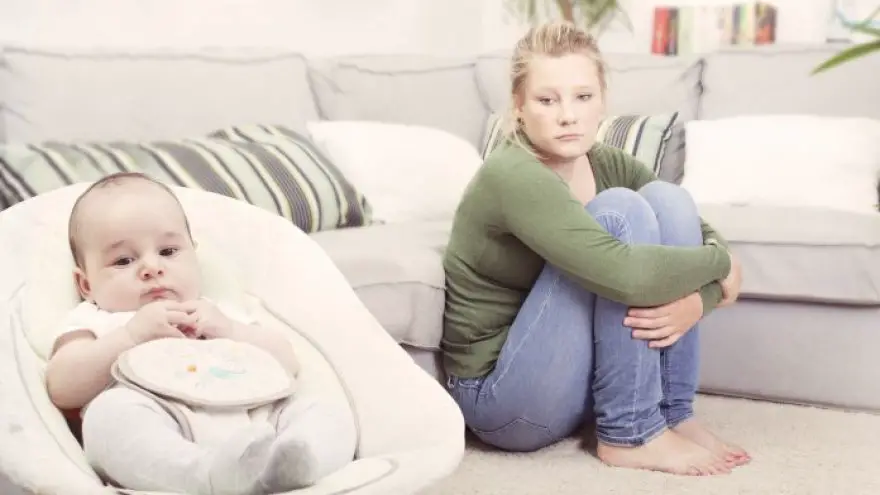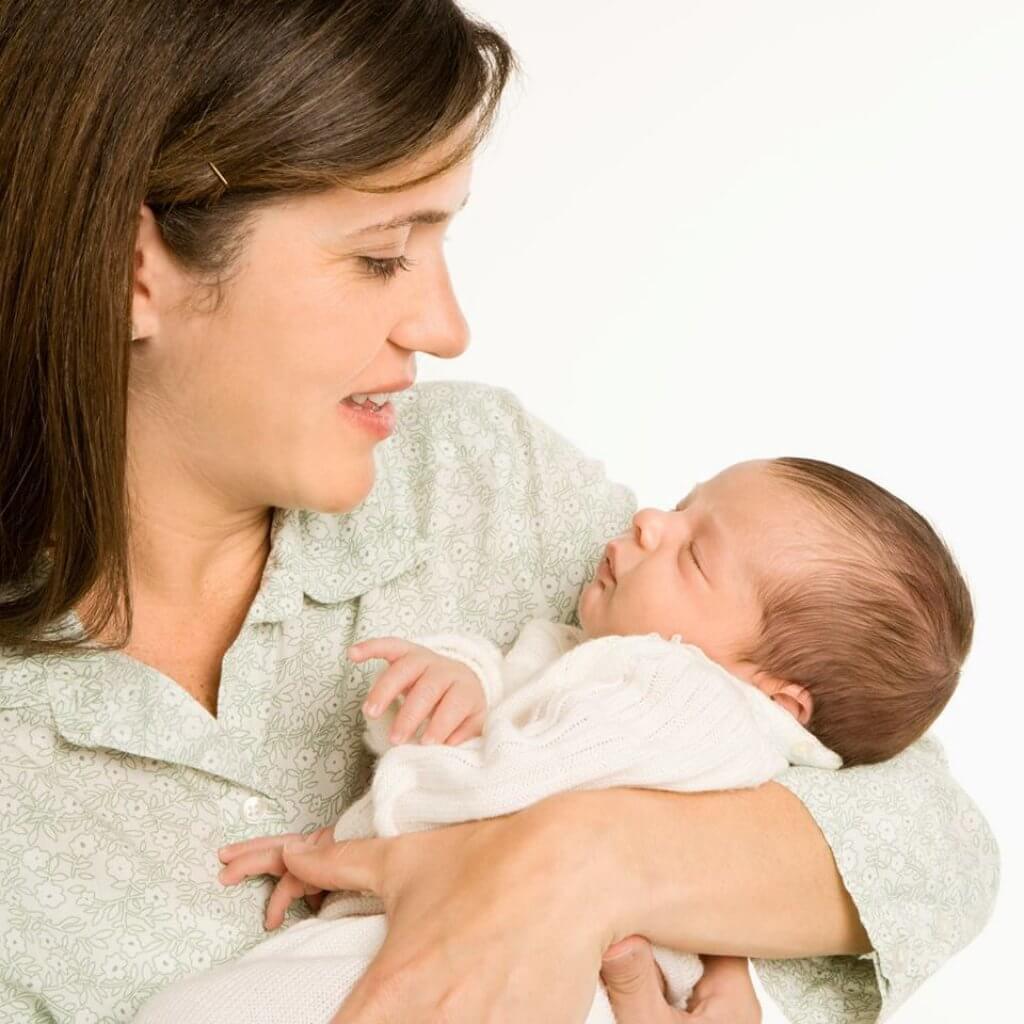Postpartum Depression: Ways to Cope and What to Know

After nine months of grueling exhaustion your little bundle of joy is finally here! You’d think after nearly a year’s worth of suffering, sickness, fatigue, and overbearing anxiety, that all that’s left to do is the easy part: the parenting, (sorry to say, but parenting isn’t exactly the easiest thing in the world).
Even though the trials and tribulations of the actual pregnancy have ended, and it’s now time for you to roll up your sleeves and get right into the parenting part, there’s still one more adversity you may have to overcome: postpartum depression.
Not every mother experiences postpartum depression (roughly one in seven women will go through it), but for the mothers who do struggle with postpartum depression, it feels like a terrifying drop into the darkest depths of the abyss.
As a mother who suffers from postpartum depression, you’ve already been forced to go through so much just by carrying your baby for nine months. You’ve gone through all the trouble of trying to maintain your own health and sanity throughout the pregnancy process; now you have to experience an excruciatingly overwhelming misery just when you thought you’d finally be able to enjoy all the wonders of being the mother of a newborn baby. (Being the mother of a newborn is hard no matter what, but it’s still an extraordinary feeling).
It’s very common for mothers of newborns to experience sadness and depression after the birth of the baby. This is known as the “baby blues”, and you’re probably not naïve enough to think that once your baby is born that you’ll be running laps around the room and singing at the very top of your lungs.
But maybe you’re experiencing a little more confusion and despair than you had initially prepared for (if you can really prepare yourself at all for this sort of thing). The baby blues are tough; postpartum depression is even more so.
The baby blues

Even though the baby blues aren’t nearly as extreme as postpartum depression, it’s still worth discussing, so that you know for sure whether or not you’re experiencing postpartum depression when the time comes to make such considerations.
Roughly 70-80% of mothers will experience the baby blues, and, just like postpartum depression, it’s brought on by changes in hormones. Your body has gone through so many hormonal changes, and that means you’ll still experience changes after the birth.
The baby blues typically start about a week after the birth of your baby. The symptoms will peak after one week, and by the end of week two you should be feeling better. During the baby blues period you’ll exhibit symptoms such as anxiety, mood swings, sadness, and fatigue.
You’ll experience the same symptoms of the baby blues if you have postpartum depression, but the symptoms will be felt to a much stronger degree, and the number of symptoms experienced will be greater. Not only will the symptoms manifest themselves in a stronger way, but the symptoms will also last for a much longer period of time.
Postpartum depression symptoms

If you feel your body just can’t shake the baby blues after the average timespan—and your symptoms increase in magnitude—it’s very possible that you have postpartum depression.
Again, the same symptoms of the baby blues will be present, but they’ll definitely be experienced to a more extreme extent.
You already understand that you’ll go through devastating depression, fatigue, and anxiety that—in the case of postpartum depression—could be crippling. And again, if it’s postpartum depression you’re dealing with, all the previously mentioned systems will be felt more powerfully.
Other symptoms of postpartum depression include an inability to take care of your newborn (which can result in a feeling of hopeless worthlessness), withdraw from your partner or close family and friends, suicidal thoughts, lack of sleep, irritability, general confusion, and appetite issues.
Postpartum psychosis
Unfortunately, postpartum depression can go to even further, into postpartum psychosis. If you have postpartum psychosis all the previously mentioned symptoms will be experienced, along with infanticide or thoughts of harming your newborn (which can also result in feelings of guilt), hallucinations, strange or atypical behavior, and paranoia.
You should talk with a healthcare professional whether you’re going through postpartum depression or postpartum psychosis, but you have to make sure you get help as soon as possible if you’re experiencing postpartum psychosis—at this point you, your family, and most importantly your baby, could be at serious risk for harm.
How to cope with postpartum depression
Okay, so it’s clear to you that you’re suffering from postpartum depression. With all the feelings of depression and hopelessness flying around, you may feel that there’s nothing you can do, or you simply might not care or feel motivated to do anything.
Fortunately, there’s actually plenty you can do to help you cope with the debilitating torment of postpartum depression.
Secure attachment and bonding
This coping method can be extremely tough—especially considering that postpartum depression might already make it difficult for you to bond with your baby.
If you try this coping method—and you feel like it’s not working due to the depression you’re experiencing—it’s so important that you at least try the attachment approach as a coping mechanism for as long as you can.

Attachment is essentially another word for bonding with your baby. You should bond with your baby regardless of whether or not you suffer from postpartum depression, but trying your best to bond with your newborn while you’re in the tight grip of despair and severe dejection, can be of great benefit to the utter anguish and fatigue of postpartum depression.
The benefits of attachment are twofold: your baby gets the emotional attention she needs, and you get closer and closer to overcoming your postpartum depression.
With attachment, giving your baby emotional support and attention isn’t exactly a verbal form of communication. Attachment involves acknowledging the subtleties of the facial expressions of your newborn (and reacting to the expressions accordingly).
This means that if a smile appears on your newborn’s face, that you should smile back; the same goes for a frown. You basically have to show your newborn that you understand her feelings, but do so without having a conversation, so to say.
Of course, you and your newborn can’t exactly carry out a dialogue, but you just have to communicate using facial expressions.
The main point of attachment is simply to strengthen the bond between you and your newborn. When experiencing postpartum depression, you may feel bonding is difficult, but attachment is a great way to build the foundation of a bond without feeling like you have to attend to your newborn at every waking moment in order to ensure that she gets the love and care that she needs.
This doesn’t mean you should ignore your newborn in all other instances, but attachment is not that difficult of a task (try not to even think of it as a task, just try to have fun). And remember, bonding always makes a person feel good.
Take a little bit of alone time

Alone time is helpful during any moments of stress. Of course, isolation is never good—no matter the level of stress your feeling—but it’s ok to just take a moment alone and breathe.
Spending time alone may seem like an odd choice to cope with postpartum depression (seeing as how babies need their parents), but it’s a great option for your mental and emotional health during such an exhausting and turbulent time.
Instead of spending every single moment with your newborn, see if you can get someone to help care for your baby while you spend some time relaxing. Calling on family members to watch your baby for a little while is always a great choice, as is turning to a friend.
Your family members are going to want to get the chance to get close to your baby, they are family after all, and alone time for you is a great way for family members to bond with your newborn. And of course, hopefully you have a loving partner by your side to step in and take action when it’s absolutely necessary.
It’s also important to remember that alone time doesn’t just translate to stepping into the bedroom to get peace and quiet. Doing activities that aren’t strenuous by yourself is also something you need to consider as well.
It’s no good for anyone to stay cooped up in the house all day no matter who you are, and if the weight of postpartum depression is dragging you down—you definitely need to go and get some fresh air. You can take simple strolls in the park or throughout your neighborhood, or maybe you can even go to a light yoga class.
Whatever you decide to do, just remember that it’s okay to take a little bit of time to yourself. It isn’t a good idea—or even a healthy idea—to more or less run away from your problems, but a little alone time never hurt anyone.
Talk to others and don’t isolate

While time for yourself is okay, you can’t just do it constantly (one or two days a week is ideal). We all need time alone, but we also need other people in our lives. Socialization and time with others is key to strong emotional health.
If you’re inside your head all day and you don’t express yourself to anyone, you’re only going to get deeper and deeper into your own head—which will only make your doom, gloom, and misery even worse.
Many who experience depression feel a sense of seemingly inescapable loneliness—regardless of what the circumstances may be. What many don’t realize, is that those who suffer from depression—postpartum or not—are far from alone.
Often times, an individual’s sadness seems unique—and while there’s definitely a variety of factors that are specific to an individual that need to be taken into account when looking at a person’s depression—the actual feeling of depression is something we all experience; that’s something that you need to remember if your life has become affected by postpartum depression.
Not only is it important for you to remember that we all hit the wall of depression at some point in our lives, you also need to remember that you aren’t (and won’t be the last) mother to experience postpartum depression.
One of the best things you can do to help you through such tough times is to talk to other mothers. Even if the mother you reach out to has only had the baby blues (which are certainly tough) or the mother has experienced full blown postpartum psychosis—she can still be there for you and help you understand that you aren’t alone.
If you don’t know of any mothers who’ve experienced your pummeling pain, you can always attend support groups where you’ll meet mothers who have experienced the exact same agony as you have. And don’t forget, you can reach out to more people than just other mothers.
If you’re lucky enough to have a caring and compassionate partner, then you already know you can turn to your partner in any time of need. That’s what partners are there for.
Sure, you’re with your partner because you share a wondrous, beautiful, and fun bond, but that shared bond means that you’ll do whatever you can for your partner—especially when you need your partner most.
Really, you should make time with your partner a priority. After all, you are raising your little one together. While your partner isn’t experiencing the direct postpartum depression symptoms, your partner will still understand that you’re in an excruciating amount of emotional distress.
The bond a person has with their partner is a different one than any other, and you need to keep that in mind when you experience postpartum depression. There’s a certain level of care and understanding that your partner provides that other people simply can’t.
That’s not to say your partner is the only one you can turn to, but it’s important to keep in mind that you and your partner’s relationship is special for a reason.
Tensions may be high in the household, and sometimes it may seem like your partner is the last person on earth you want to turn to, but just remember that if anyone can be there to help you—your partner’s the one.
You should make time to have a romantic date night with your partner, so that you can just relax and enjoy one another’s company and feel special. Sometimes—especially when sadness is getting the better of you—feeling special is just the right remedy for depression.
A lot of the time, you don’t even have to discuss all of your pain every time you spend time with another person. You don’t have to stay bottled up inside, but sometimes it helps to just shoot the breeze and enjoy yourself—to take your mind off of that torturous torment.
Even if you turn to someone because you’re hurting, it doesn’t mean you have to let that feeling of hurt dominate every social interaction you have.
Take care of your health

It’s tough to start and maintain a consistent health regimen while in the throes of postpartum depression. Especially since postpartum depression means sadness and anxiety coupled with the already present stressors of pregnancy and post-pregnancy, which make taking care of your health a tall task), but a healthy lifestyle makes for a happy life.
You can talk to your doctor about the best foods for a healthy diet, and getting (light) exercise when possible is definitely going to help. You also have to make sure that you take the time to rest.
And don’t forget, no matter how busy any of us are, everyone needs sleep. Sleeplessness is often an issue when experiencing postpartum depression, but you should at least take some time to get a little rest.
Of course, you can’t sleep your life away, that’s not going to help your postpartum depression, but getting a little rest and relaxation when the time presents itself is going to work wonders.
Seek treatment if necessary
As with any instance in which someone experiences depression, treatment may indeed be necessary. If you feel that your postpartum depression has reached a level of extremity that is absolutely unbearable—that it goes on for months and nothing seems to be getting better—then you should seek the help of a medical professional.
Think about people who suffer from perpetual clinical depression: they often need medications in addition to therapy or any form of emotional support, and the same goes for those who experience postpartum depression.
This is a tough time in your life, and you shouldn’t be afraid to ask for help in anyway possible. With the right dose of medication in addition to therapy, sharing your feelings, and maintaining your health, your postpartum depression will become easier to deal with.
It’s going to be hard no matter what, but postpartum depression isn’t something you can overcome alone without any kind of aid. You’re going to need the support of your family and friends, and a lot of time the support of a medical professional is needed as well.
Postpartum depression is more than tough. It’s hard to grapple with feeling so low once you’ve finally had your baby. You went through nine months of pregnancy, you’ve finally brought your baby into this world, and then you feel completely debilitated by a depression that seems absolutely unshakable; it really feels like the difficulties that accompany pregnancy will never end.
It’s hard to go through so much after you’ve finally had your baby—it seems almost cruel that more hardship would be attached after so much time.
Postpartum depression may feel like the end of the world—especially since you feel like a new part of your life is just beginning, only to come to a sudden halt—but you have to remember that you aren’t alone and that help will always be there when you need it.






